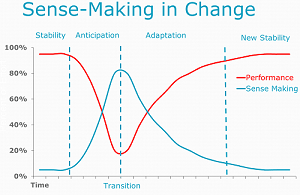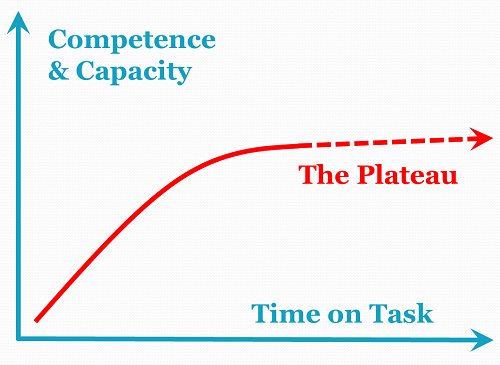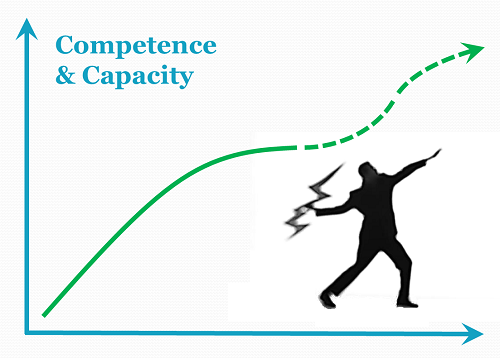When you walk in the room, who shows up for Read more →
Pausing on the Performance Plateau
Posted Tuesday, February 12, 2013Allen Slade
As you transition into a new job, sense-making takes time. Your performance suffers as you figure out the who, when, where and how of your new role.
 As time goes by, you adapt to the new situation. Your job becomes more predictable. As you enter the new period of stability, your sense-making lessens and the red line of performance flattens out.
As time goes by, you adapt to the new situation. Your job becomes more predictable. As you enter the new period of stability, your sense-making lessens and the red line of performance flattens out.
And that is when you must be most careful. Having mastered the new role, you can get complacent. Feeling you already know what you need to know, you can slow down your personal development. Your performance can get plateaued.
 The further we go in life, the more likely we are to find ourselves on a performance plateau. Here are some warning signs:
The further we go in life, the more likely we are to find ourselves on a performance plateau. Here are some warning signs:
- Stays in the same role for three years or longer.
- Loses the hunger for the next big thing.
- Resists change actively and passively.
- Gets defensive about feedback.
As a leader, you need yo watch out for the plateau effect for your employee. Since the rate of economic change is accelerating, they must master new competencies and expand their capacity to work faster and longer. Faster change is their only sustainable comptetitive advantage. Otherwise, they will be replaced or drag your organization down.
Bottom line: Treat a performance plateau as a warning sign and take action. Here’s how to trigger growth to get your people off the performance plateau.
Add new challenges. If someone is great at sales, have them take on social media. If someone has mastered six sigma, ask them to apply it in another department.
Rotate roles. Don’t always give the task to the best person for the task. You may formally rotate jobs, even for people with decades of experience. On a smaller scale, rotate responsibilities. Have your experts work outside their specialties. The database guru can plan the next meeting and the meeting planner can build your new database.
Develop their openness to feedback. Openness to feedback is the single most important trait your employees can develop. If an employee has the defend/deny/delay response to constructive criticism, coach them in accepting feedback. You can open them up to lifelong growth.
Don’t be content with stable performance. Help your people get off the performance plateau. Trigger growth with new challenges, rotating work and openness to feedback. Then, you will prepare them to charge ahead into the future with an upward curve of competence and capacity.


